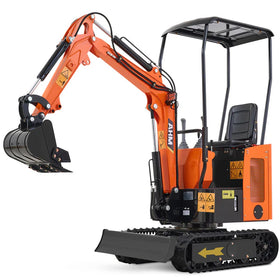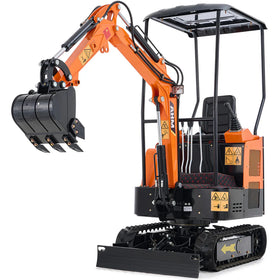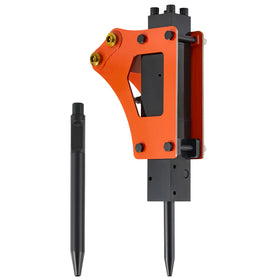The surge in urban renewal projects and increasingly complex job sites are reshaping the mini excavator market, with 1-ton machines emerging as the go-to solution for contractors tackling confined space challenges. These compact powerhouses are proving their worth across applications from precise utility installations to intricate landscaping work.
Among these machines, 1 ton mini excavators have gained significant traction due to their versatility, compact design, and cost-effectiveness. This article explores the unique features of 1 ton mini excavators that make them indispensable in urban settings while examining market trends and user preferences.
1. Market Growth Reflects Real Construction Needs

Market numbers are backing what contractors already know on the ground, that 1 ton mini excavators are becoming indispensable. The Business Research Company reports the global mini excavator market will expand from $7.88 billion in 2023 to $8.36 billion in 2024, growing at 6.1% annually. This growth reflects the shifting reality of modern construction, where precision and versatility often outweigh raw power.
Source: The Business Research Company. (2024). Mini Excavators Global Market Report 2024.
2. Understanding Mini Excavator Design Innovation
The success of 1 ton mini excavators in urban construction stems from thoughtful engineering that addresses real job site challenges. When working alongside existing structures or in tight urban spaces, these machines can rotate fully while maintaining a stable footprint, letting operators focus on precision rather than constantly watching their swing radius. If you were searching for a 1 ton mini excavator for sale, these design features often top contractors' must-have lists.
Modern hydraulic systems deliver precise control for detailed work, while ergonomic cabs help operators maintain productivity during long shifts. This combination of comfort and capability makes these machines particularly valuable for projects requiring sustained attention to detail.
3. Advanced Capabilities Through Smart Engineering

The true value of these machines lies in their sophisticated engineering. Advanced hydraulic systems power precise movements, making delicate tasks like utility installation and landscape grading possible. These capabilities extend beyond simple digging to include specialized operations that traditionally required multiple machines.
4. Versatility Through Mini Excavator Attachments
Smart contractors are maximizing their ROI by leveraging the full attachment ecosystem of 1-ton excavators. A single machine can transition from breaking concrete with a hydraulic hammer to precisely grading landscapes or installing utilities — all within the same day — turning one machine into a complete job site solution.
Want to explore how mini excavator attachments can expand your project capabilities? Our detailed guide covers everything you need to know about choosing the right attachments for your work.
5. Operator Experience Drives Precision Performance

Today's urban projects demand exceptional precision, which starts with operator comfort. Modern mini excavators feature ergonomic controls, enhanced visibility systems, and reduced vibration designs. These improvements help operators maintain accuracy during complex tasks in confined spaces.
6. Economic Benefits Drive Adoption
The numbers tell a clear story: contractors running 1-ton excavators are seeing measurable improvements in their bottom line. Lower fuel consumption — often 20-30% less than larger machines — combines with reduced maintenance requirements to slash operating costs. Add the ability to bid on a wider range of projects, and these machines start paying for themselves faster than traditional equipment choices.
7. Real-World Applications
The versatility of 1 ton mini excavators makes them suitable for various urban applications:
- Utility Installations: These machines excel at digging trenches for water, gas, or electrical lines without obstructing traffic or pedestrian pathways.
- Landscaping Projects: Contractors frequently use them for precise excavation tasks such as planting trees or installing drainage systems.
- Small-Scale Demolition: Their compact size allows for efficient removal of small structures or debris from tight spaces where larger equipment would be impractical.
Even demolition work becomes more manageable, as these machines can access and clear debris from spaces larger equipment can't reach.

8. Technology and Future Development
The evolution of mini excavators continues through technological advancement. Manufacturers are developing electric models to meet growing environmental concerns in urban areas. Advanced telematics systems are making these machines smarter and more efficient. The rental market is expanding to offer more flexible access options for contractors seeking temporary solutions.
9. Making an Informed Equipment Choice
Contractors considering 1 ton mini excavators should evaluate:
- Project space constraints and access requirements
- Common task types and attachment needs
- Local environmental regulations
- Available dealer support and maintenance resources
Understanding these factors helps ensure your investment delivers maximum value across all your projects.
AHM Mini Excavators: Engineering Meets Urban Needs
As contractors seek solutions for modern urban construction challenges, AHM's 1 ton mini excavator series demonstrates how thoughtful engineering addresses these demands. Built around the core needs we've discussed - power, efficiency, and versatility - these machines offer practical solutions for today's construction requirements.
AHM's design brings together key features that urban contractors need: a compact frame that maintains power, multiple attachment options for varied tasks, and an innovative track-and-wheel system for enhanced mobility. This combination directly addresses the challenges of urban construction work, from tight space navigation to quick site transitions.

10. Shaping the Future of Urban Construction
Looking ahead, the role of 1 ton mini excavators in urban construction will only grow more significant. Their unique combination of compact design, versatility, and precision makes them essential tools for modern urban development. As cities continue to evolve and construction challenges become more complex, these machines will remain at the forefront of urban construction innovation.
These machines have proven themselves essential in modern urban construction by delivering three crucial benefits: engineering excellence that enables precise operation in tight spaces, versatility through attachments that multiplies their value, and economic advantages that improve project profitability.







